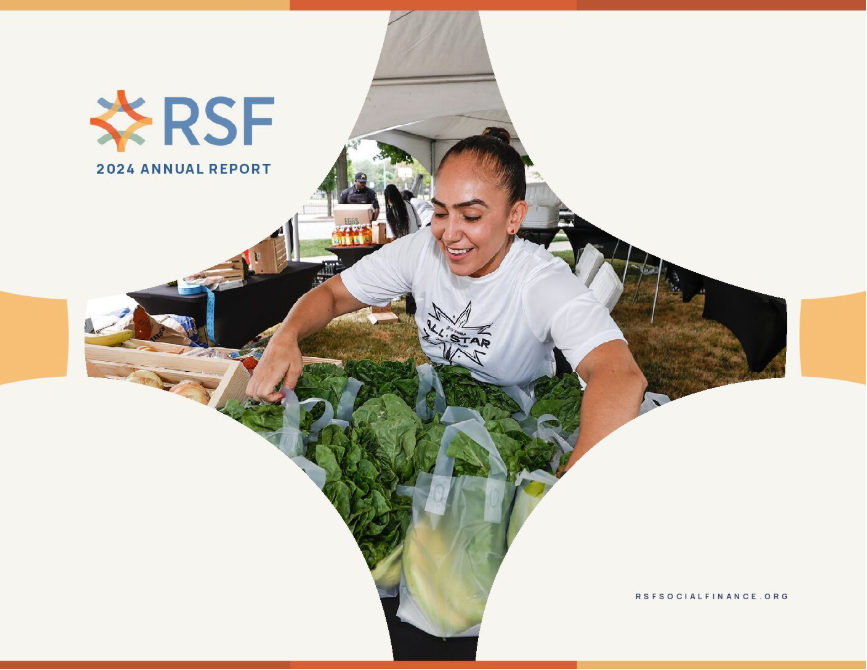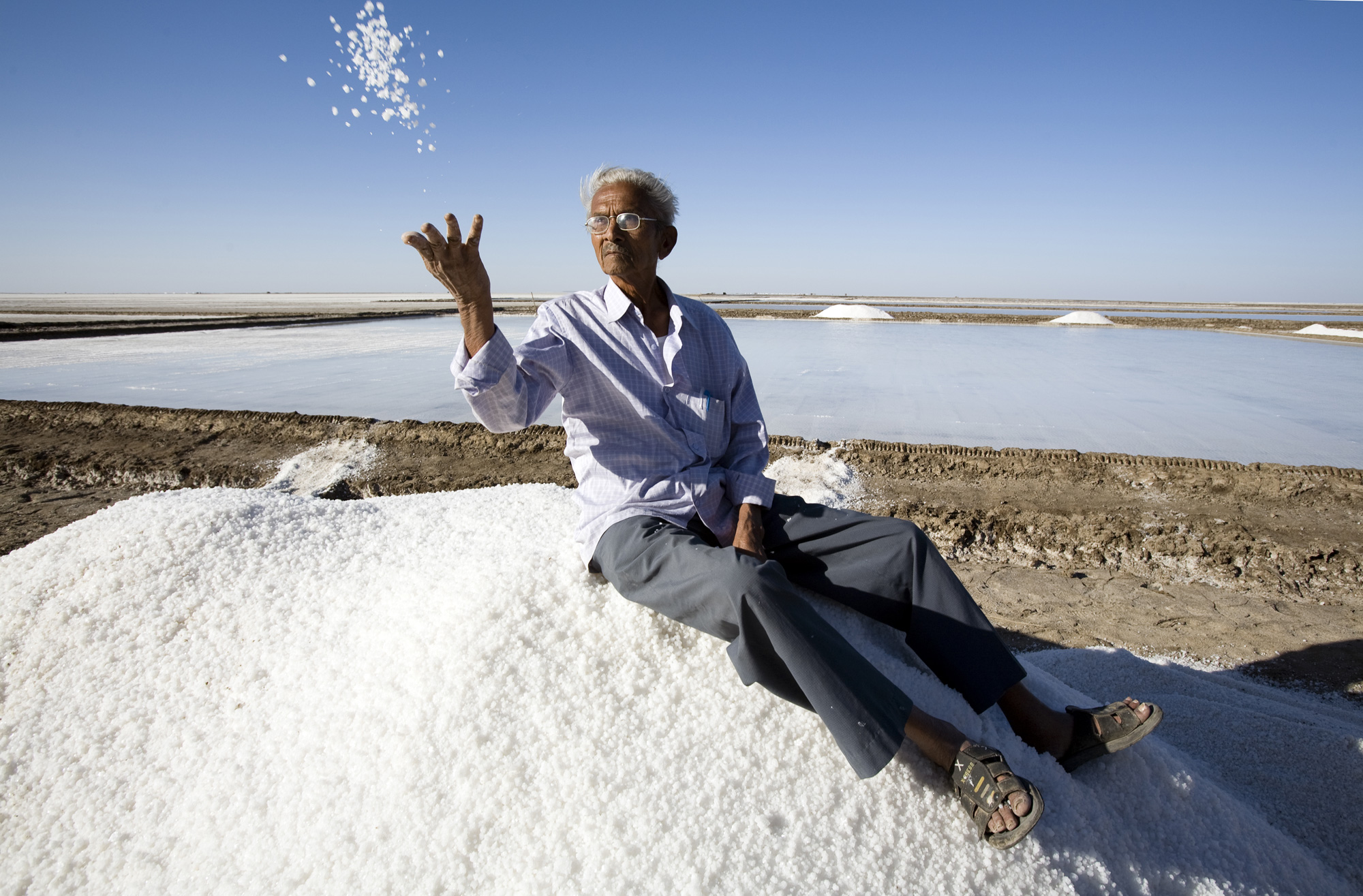Dear Friends,
For the last ten years, I have had the honor of serving as RSF’s president and CEO. On the eve of my departure, I reflect on what we have accomplished as a community of staff, board, clients, partners—and what makes RSF so special and unique.
I love RSF. It’s a rare bird; one that you have to work hard to find in the forest despite our bright feathers! We are a radical combination of humility and ambition.
We don’t strive to capture assets. We have never tried to be a leader in the impact investing industry. We aim for potency, not scale—meaning two things: (1) the unit for transformation is each relationship, each and every conversation and agreement, and (2) we see ourselves as a thread in an interconnected network tapestry. The whole matters most.
So while we are a financial intermediary trying to connect entrepreneurs with investors and donors as best we can, our purpose is to deeply question conventional assumptions and see what is possible, in concrete terms, according to the highest aspirations of the human spirit.
The following are some highlights of the incredible work and thinking from the past ten years:
Direct, transparent, and personal
The current financial system is complex, opaque, anonymous, and based on short-term outcomes. We think—in fact, we know—that people are better served by financial relationships that are direct, transparent, personal, and focused on long-term economic and ecological benefit. We’ve known this to be true since we started in 1984, and it has been the lens through which we have made many decisions over the years. (And last year, we adopted it as our new mission statement.)
This commitment to direct, transparent, and personal financial relationships has driven innovations, illuminated the approach to our work, and informed us not do things that may have been considered “good business” for RSF.
In the fall of 2009, we decided to abandon LIBOR as the basis for our loan pricing, in favor of a community-based process. In that moment, we essentially went off-grid of Wall Street. Since then, we have hosted 34 quarterly pricing meetings between our investors and our borrowers so that they can discuss and make recommendations on RSF’s interest rates.
In December 2010, we sold our unrestricted publicly traded stock. This was not a market-timing move. We decided that everything we did had to be direct and personal. We would have more than $200 million in assets today if we had stayed invested in the public markets, but it wasn’t a mission fit for us.
We have focused on the “how” relative to the “what” of our work. With the entrepreneurs we serve, and even with the entrepreneurs who we can’t approve for investments, loans, or grants, the amount of time and energy we devote to giving them guidance is impossible to measure.
Many of our investor and donor clients are “arriving” at RSF at the point of wanting to align their money with their core values. They have zillions of questions about impact investing, where to go, which conferences to attend, what initial investments to make, etc. Since we are not financial advisors, we don’t make specific investment recommendations, but we do serve as a kind of concierge to help these individuals and families navigate the terrain.
Starting in 2010, we began an exploration to get a CUSIP number, and register our Social Investment Fund notes on different platforms, like Schwab, so that investment advisors all over the country could “sell” our flagship “product.” After a significant amount of effort, and despite there being substantial interest from the advisor community, we decided to abandon this effort—again, because it would move us by one (big) step away from the actual human being who would be investing with us.
In 2013, I was approached by a member of the global executive team of a major multinational bank, who expressed serious interest in investing $100 million with us. When I asked what the source of funds was, he didn’t know, nor did he understand why it mattered. He assumed that the path in the financial services industry always progressed towards big institutional money—he assumed that what he was offering was the holy grail for RSF. I respectfully declined, letting him know that we have investors because the personal relationship is everything to us.
Remaking the food system
In 2009, at our 25th anniversary celebration, we convened a group of social finance leaders who said, “If we get food right, everything else will follow.” In many ways, food is the root system within a healthy regional economy, and the local food movement continues to gain incredible momentum. We have been one of the largest and most catalytic funders of local food systems in the US over the past decade, and have leveraged our learning and direct experience to address unmet needs.
Our integrated capital approach—the coordinated use of different forms of financial capital and non-financial resources to support an enterprise that’s working to solve complex social and environmental problems—is how we’ve worked since day one but the approach broadened considerably while determining how best to support local food systems.
During 2009-2010, we had many discussions about whether we should fund bigger and bigger loans to organic consumer products enterprises or instead migrate “upstream” to make smaller loans to food distributors, aggregators, and processors who were building the infrastructure for healthy, diversified regional food systems based on regenerative agriculture. We chose the latter because it was more needed. It was harder too, and our average loan size decreased for many years following that decision. All lenders know it takes just as much work to make a $100,000 loan as it does a $1,000,000 loan, and often more. But we stuck with it, and created our Food System Transformation Fund, a first-of-its-kind pooled shared-risk fund where foundations that want to make Program-Related Investments can do so through RSF instead of making the investments and loans one-by-one on their own. And this led to creating our Local Food Capital Collaborative, a philanthropic fund designed for donors who want to support local food hubs and other infrastructure. The Local Food Capital Collaborative (along with our other collaboratives: Biodynamics, Fair Trade, Soil Health, and Women’s Capital) greatly expand RSF’s ability to support earlier stage and uniquely modeled enterprises—because the money is gifted to RSF, we can use the funds in whatever way will best support the success of the entrepreneurs, whether it be as low-interest loans, equity investments, loan guarantees, or grants.
Financial activism
Much of what I have shared demonstrates that how RSF shows up and how we get our work done is unique. Another key aspect of RSF’s existence in the world is building the field of social finance—supporting an ecosystem of people and organizations that are questioning assumptions about the existing financial system and working to build relationships through financial transactions.
We co-authored a white paper with Leslie Christian in 2011, “A New Foundation for Portfolio Management,” that questions many of the key assumptions of modern portfolio theory and continues to be an educational tool for us and others.
Our Shared Gifting program has been expanded and adopted by others. This methodology connects donors and grantees in a way that completely transforms the power dynamics of traditional philanthropy. Instead of a donor deciding where his or her grant dollars go in a closed-door, top-down way, the grant recipients (within a sector or field) are invited to a process by which they decide how the available funds are granted—with the underpinning being that they know best, and by coming together to talk face-to-face about their needs and intentions, real relationships will develop that dissolve competition and lead to collaboration. Pioneered by one donor and a group of Waldorf schools in the Midwest 25 years ago, the practice has been expanded and accelerated substantially over the past five years to many other areas and fields of interest.
We’ve developed a unique lending program based on trust underwriting. We partner with fair-trade companies we know well (our borrowers and former borrowers) to provide loans to their suppliers through our Fair Trade Capital Collaborative. We make our decisions based on our relationships with these companies: we trust them, so we are willing to rely on them to accurately assess the reliability of their suppliers. That means we can forgo some aspects of traditional due diligence and deliver affordable loans to those suppliers. And in line with our integrated capital approach, we also fund technical assistance, which small-scale suppliers often need to succeed.
In October of this year, we launched our Integrated Capital Fellowship, an intensive program designed to provide the education and strategies that practitioners need to help values-driven philanthropists and investors deploy capital for lasting social and environmental benefit. The fellowship is the first program for financial practitioners who want to focus on integrated capital. We have an incredible group of 24 fellows and will begin the application process for the next cohort in early 2018.
In so many ways, through sponsorships, board service, learning experiences, and program development, we have nurtured and transformed the whole ecosystem of social finance in a spirit of good will.
I will now join the RSF alumni network, with so many others like Esther Park, Taylor Jordan, and Bob Dandrew, who have done such meaningful work after their time here.
I could go on about RSF’s work and our approach for pages! I truly have been inspired daily by my colleagues and our community and everything we have worked so hard to accomplish. While I am moving on from my post as president and CEO, I look forward to being an ambassador for RSF for years to come!
With love and joy and gratitude in this holiday season,
Don


